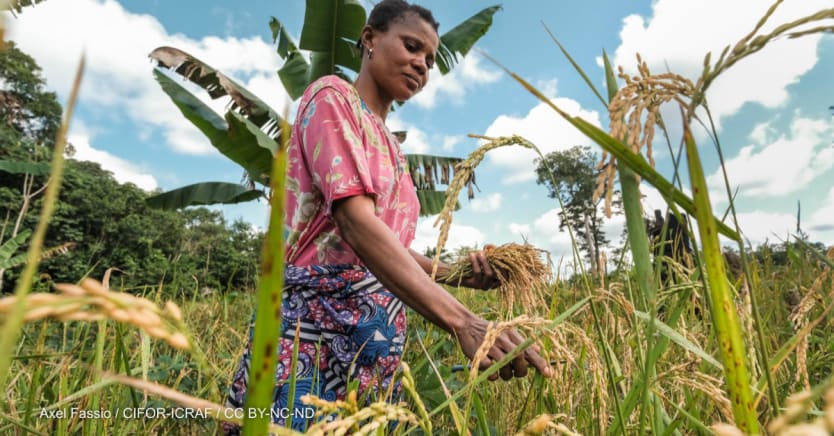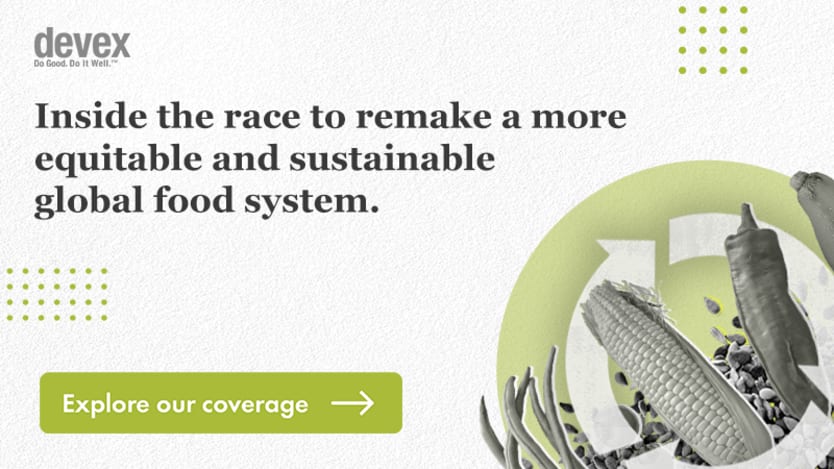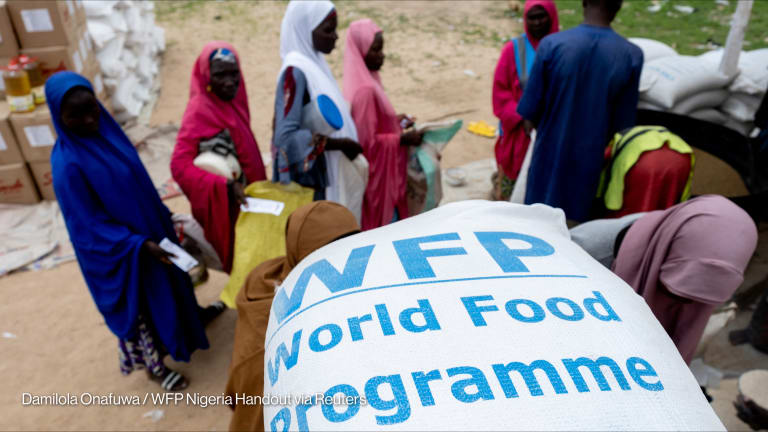
Nutrition advocates are looking to the upcoming 27th United Nations Climate Change Conference, or COP 27, as an opportunity to team up with climate advocates behind the common goal of increasing access to sustainable diets that are healthy for people and the planet.
Integration of food systems into the climate agenda has often focused on agriculture, which is responsible for about one-third of greenhouse gas emissions. This has largely excluded the explicit mention of nutrition, which focuses not only on the sufficient production of and access to food but also on ensuring that it is healthy and affordable.
Last year’s U.N. Food Systems Summit, which was organized around six thematic tracks, sought to bring together people from across the food system to collaborate on one agenda. That process saw the chairs of two different tracks — the Global Alliance for Improved Nutrition’s Lawrence Haddad and the World Wildlife Fund’s João Campari — realize a joint effort could be mutually beneficial to both organizations.
“If you work on food systems and nutrition, you cannot not work on the environment. That realization has set in for lots of people, including us,” Haddad said.
While the summit was, at times controversial, for several reasons, including the role of multinational food companies, Campari said he found the process “super positive” as it led to new relationships. GAIN and WFF have since signed a memorandum of understanding to continue their work together.
“We at WWF, we wanted to understand and act more on the nutrition space and human health space for the same reasons,” Campari said. “We cannot separate planetary health from human health. The only way to sustain the health of people is to sustain the health of the planet, and we need to respect planetary boundaries while doing that. What we did with GAIN, we recognized that both organizations were philosophically aligned.”
GAIN has brought on Jessica Colston, who had managed the action track chaired by Campari at the U.N. Food Systems Summit, to lead its climate work. She said she has heard lots of interest, particularly from African countries, in incorporating nutrition into COP 27 in November in Egypt.
Momentum around the September Food Systems Summit wasn’t strong enough to get food systems formally on the agenda at COP 26, hosted by Scotland. This year’s agenda of the 11-day event does include agriculture and food systems on a day for “adaptation and agriculture.”
More than 15 organizations will also host a Food4Climate Pavilion, which will highlight “how the food and agriculture system needs to change in order to effectively tackle the climate crisis.”
But there is no mention of nutrition on the formal COP 27 agenda.
GAIN has drafted a set of ideas for a potential nutrition day, Haddad said, and he has been speaking with Egyptian officials.
“What’s in it for the climate people? I think they’re beginning to wake up to the fact that food systems are responsible for 35 to 40% of greenhouse gas emissions,” Haddad said. “And the thing that really gives it a bit of alignment is that the more perishable, more nutritious foods tend to be the ones that are lost and wasted, therefore losing and wasting emissions, and tend to be the ones that are the most generating of emissions, and the ones that are perhaps the least resilient and resistant to the extremities of climate.”
Stronger Foundations for Nutrition, a group of nutrition philanthropies, has been working with its members on how the community can engage in COP 27, according to Executive Director Matt Freeman.
“We cannot separate planetary health from human health. The only way to sustain the health of people is to sustain the health of the planet, and we need to respect planetary boundaries while doing that.”
— João Campari, food practice global leader, World Wildlife Fund“Nutrition is often left in the corner — whether that’s of its own doing or as part of how it’s perceived in its relative importance vis a vis other global priorities — the result is the same: It’s usually left out of the conversation,” Freeman said. “It’s an interesting moment in nutrition and climate, particularly on the food side because the climate community is itself recognizing and talking quite a lot about the role that food systems play in driving climate change.”
He said that while both climate and nutrition communities have expressed concern about having their objectives underfunded, he hopes that coming out of COP 27, there will be more joint efforts to increase financing.
Haddad said that nutrition’s “two camps” can be resistant to such efforts. One focuses on keeping everything “pure and nutrition-focused,” he said.
“And there’s the ‘we want to grow nutrition — it may not be pure, it may not be perfect, but it’s better to have lots of people in the tent rather than a few,’” Haddad said. “I’m very clearly in that second group and I think this is an opportunity to grow the nutrition tent.”
He said it was a positive sign that the World Food Prize Foundation chose this year to recognize the link between food systems and nutrition and climate change by naming climate scientist Cynthia Rosenzweig the 2022 winner of the “food and agriculture Nobel Prize.” The prize, which Haddad won in 2018, is given to someone who has focused their career on eradicating global hunger through improving the quality, quantity, or availability of food.
Climate change is part of a “triple challenge” that also includes food insecurity and biodiversity loss, Campari said. He emphasized the importance of diversifying diets not only to increase food security — to avoid major ripple effects when staple crop production is threatened, such as with Ukraine's wheat supply — but also to increase biodiversity and sustainability. Just 12 plants and five animals make up 75% of people’s caloric intake, he said.
Campari said he was hopeful that current events — soaring food, fuel, and fertilizer prices partly spurred by Russia’s invasion of Ukraine and the lingering effects of the pandemic — will demonstrate why the world cannot afford to exclude food systems from COP 27.
“The attention to food is immense. But my fear is that we will fall into the comfort zone which is to deal with agriculture alone and not the other parts of the food system. We need systemic approaches to deal with food. Talking about agriculture is important but there are other things that are important too,” Campari said. “If you try to fix food insecurity with a disregard for climate, climate will come and haunt food systems later. If you try to address climate without taking into consideration food, you’re not going to be resolving it.”









